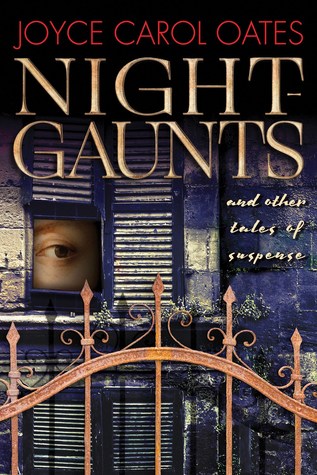Copyright 2018 by Gary L. Pullman
A blurb on the back cover
of Night Guants and Other
Tales of Suspense (2018) summarizes “The Woman in the
Window,” one of the stories by Joyce Carol Oates's which appears in her latest collection:
A
woman, naked except for her high-heeled shoes, seated in front of the
window of an apartment she cannot afford [sic].
In this exquisitely tense narrative reimagining Edward Hopper's
Eleven A.M. [painting],
the reader enters the minds of both the woman and her married lover,
each consumed by alternating thoughts of disgust and arousal, as he
rushes, amorously, murderously, to her door.
It's
only a matter of which illicit lover with strike first, and Oates
keeps her readers guessing until the last moment of her tale.
The
title of Oates's story characterizes its protagonist, as a line in
the narrative itself reminds readers: “She is the woman
in the window.” In
objectifying her and by reducing her to such a status, Oates perhaps
invites comparisons of other objects seen in windows: merchandise,
mannequins, pets (“how much is that doggie in the window?”) and,
in some countries, prostitutes. The difference between these other
objects in windows and the woman in the window is that the latter can
think and feel, and her thoughts and feelings are aired, as it were,
in the story:
His
wife is not young. She is not so beautiful as I am. When he sees her,
he thinks of me.
Next
time you touch me! You will regret it.
Of
course he loves me. That is the face of love.
Most
of her thoughts are about her lover:
Nude
he calls it. Not naked.
. . .
He
can say anything he likes. It's
a masculine prerogative to say the coarsest, cruelest words uttered
with a laugh—as a man will do. . . .
Such
soft skin. Amazing . . . . His
voice catches in his throat. . . .
However,
the story's omniscient narrator challenges her thoughts or informs
the reader of the truth that her thoughts skirt or hide:
His
wife is not young. She is not so beautiful as I am. When he sees her,
he thinks of me.
(But is this true? The past half-year, . . . she has not
been so certain) . . . .
The
omniscient narrator also tells the reader about the woman, and, by
convention, an omniscient narrator is always to be considered
truthful and reliable:
She's
doing what she does best:
waiting. . . .
Nude
he calls it. Not naked.
(Naked
is a coarse word! He's a gentleman and he feels revulsion for
vulgarity. Any sort of crude word, mannerism—in a woman.)
She
understands. She herself disapproves of women uttering profanities.
Only
when she's alone would she utter even a mild profanity—Damn!
God damn. Oh hell . . .
Only
if she were very upset. Only if her heart were broken. . . .
She
has come to hate her entrapment here. Where it is always eleven A.M.
and she is always waiting for him.
The
more she thinks about it the more her hatred roils like smoldering
heat about to burst into flame.
She
hates him for trapping her here.
For
treating her like dirt.
It's
as though the omniscient narrator is part of the woman, her
subconscious mind, perhaps, now supporting her, now challenging her,
now telling her the truth about herself, even as she comes to realize
facts about herself that have been hidden from her for months or
years. She comes to see herself not as she pretends or wants to be,
but as she is, as she has become, but she blames her lover for the
hated transformation her adulterous affair with him has brought her.
It is his fault, not hers. He has trapped her; he treats “her like
dirt”; he is her “oppressor”; he has “murdered her dreams.”
Now,
she thinks, he must be “punished,” and her weapon of choice, “a
female weapon: sewing shears,” will free her, avenge her, deliver
her, restore her.
Ironically,
of course, if she wins the contest and kills him before he can kill
her, the act of murder will not have any such effect; instead, it
will imprison her, both in a house of correction and in her own mind,
for it is she, not simply her body, that is entrapped, and she is as
much the predator, as much a victim of her own fears and
self-deception and compromised character, as she is his prey.
The
woman in the window is complex—much more so than she needs or
should be. Therein lies her true predicament, the naked truth about
her that she seeks to hide and to ignore.





